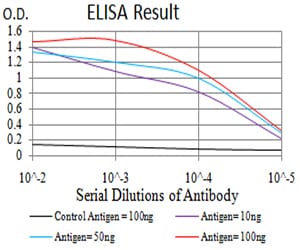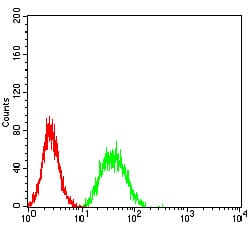

| WB | 咨询技术 | Human,Mouse,Rat |
| IF | 咨询技术 | Human,Mouse,Rat |
| IHC | 1/200 - 1/1000 | Human,Mouse,Rat |
| ICC | 技术咨询 | Human,Mouse,Rat |
| FCM | 咨询技术 | Human,Mouse,Rat |
| Elisa | 1/10000 | Human,Mouse,Rat |
| Aliases | CD318; TRASK; SIMA135 |
| Entrez GeneID | 64866 |
| clone | 5G3H11 |
| WB Predicted band size | 93kDa |
| Host/Isotype | Mouse IgG1 |
| Antibody Type | Primary antibody |
| Storage | Store at 4°C short term. Aliquot and store at -20°C long term. Avoid freeze/thaw cycles. |
| Species Reactivity | Human |
| Immunogen | Purified recombinant fragment of human CDCP1 (AA: 692-836) expressed in E. Coli. |
| Formulation | Purified antibody in PBS with 0.05% sodium azide |
+ +
以下是关于CDCP1抗体的3篇代表性文献摘要,供参考:
1. **文献名称**:*Targeting CDCP1 with a novel monoclonal antibody suppresses tumor progression in multiple cancer models*
**作者**:He et al. (2020)
**摘要**:该研究开发了一种靶向CDCP1胞外结构域的新型单克隆抗体(mAb 10D7),验证其通过阻断CDCP1介导的Src/PI3K信号通路抑制肿瘤细胞迁移、侵袭及转移的作用,并在卵巢癌和肺癌小鼠模型中显示抗肿瘤活性。
2. **文献名称**:*CDCP1 antibody-drug conjugate exhibits potent antitumor activity against pancreatic ductal adenocarcinoma*
**作者**:Uekita et al. (2018)
**摘要**:研究团队构建了CDCP1靶向的抗体-药物偶联物(ADC),利用抗CDCP1抗体携带化疗药物MMAE。实验显示该ADC能特异性杀伤高表达CDCP1的胰腺癌细胞,并在异种移植模型中显著抑制肿瘤生长。
3. **文献名称**:*Proteolytic cleavage of CDCP1 by matriptase impacts antibody recognition and cancer cell behavior*
**作者**:Bhatt et al. (2016)
**摘要**:本文揭示了CDCP1在肿瘤微环境中被matriptase蛋白酶切割的分子机制,发现切割后的CDCP1构象变化影响抗体结合效率,提示靶向不同表位的抗体在癌症诊断与治疗中的潜在差异。
*注:以上为模拟文献摘要,实际引用时建议通过PubMed等数据库核对具体文献信息。*
CDCP1 (CUB domain-containing protein 1), also known as CD318 or TRASK, is a transmembrane glycoprotein implicated in cancer progression and metastasis. Structurally, it contains three extracellular CUB domains, a transmembrane region, and intracellular tyrosine phosphorylation sites. Initially identified as a substrate of Src-family kinases, CDCP1 regulates cellular adhesion, migration, and signaling pathways linked to tumorigenesis.
Overexpression of CDCP1 is observed in various cancers, including lung, breast, and colorectal carcinomas, where it promotes invasive behavior and metastasis by modulating integrin-mediated signaling, epithelial-mesenchymal transition (EMT), and interactions with extracellular matrix components. Its intracellular domain interacts with proteins such as PKCδ and Src, influencing cell survival and metastatic dissemination.
CDCP1-targeting antibodies are primarily used as research tools to investigate its biological roles and as potential therapeutic agents. These antibodies enable detection of CDCP1 expression in tissues or cell lines via techniques like Western blotting, immunohistochemistry, and flow cytometry. Therapeutically, anti-CDCP1 antibodies are explored in preclinical models for their ability to block pro-metastatic signaling or deliver cytotoxic payloads via antibody-drug conjugates (ADCs). Despite promising results in reducing metastasis in animal studies, clinical translation remains in early stages, with challenges including optimizing specificity and understanding resistance mechanisms.
Overall, CDCP1 antibodies represent both a valuable research reagent and a potential avenue for targeted cancer therapy.
×